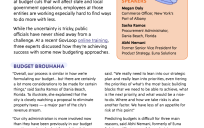 Right now, at least four different generations are actively engaged in local government as community members, homeowners, taxpayers and voters. In this space, we explored the unique attributes of Gen Z and its important intersection with government. The national study cited in that article shows, on a broader scale, that all generations have different experiences, expectations and approaches to government. This creates a wonderful diversity, but it also creates a challenge: How can governments adequately serve and engage these major generations?
Right now, at least four different generations are actively engaged in local government as community members, homeowners, taxpayers and voters. In this space, we explored the unique attributes of Gen Z and its important intersection with government. The national study cited in that article shows, on a broader scale, that all generations have different experiences, expectations and approaches to government. This creates a wonderful diversity, but it also creates a challenge: How can governments adequately serve and engage these major generations?
As governments continue to accelerate advancements in the wake of COVID-19’s disruption, now is the perfect time to answer the question and understand and apply this critical generational context.
Following are top insights for local governments from the research:
1. Reaching All Generations
Reaching diverse constituents from Gen Z to Baby Boomers is perhaps the surest example of the folly of a “one-size-fits-all” approach. The research shows a clear generational breakdown in how the different groups find or receive government information:
- Websites, social media, and word of mouth top the favorite information channels.
- Nearly two-thirds of Boomers and Gen X find or receive information about government services via website.
- More than half of Millennials and Gen Z, on the other hand, prefer to find local government information via social media.
- Millennials and Gen Z receive information from local government much more frequently than Gen X, and significantly more so than Boomers, because of their higher usage of real-time digital communication channels.
To capture Gen Z, local governments must catch up with real-time digital channels that also increase the frequency of constituents’ engagement with government information. In an era of public health crises, mobile apps are essential to any modern emergency communications plan. With push notifications, local governments can quickly disseminate emergency news directly to citizens, targeted by location, when immediate action is necessary. Websites, however, cannot be ignored, as they still function as the top information channel for groups in the study. Particularly for Gen X and Boomers, governments need to make sure that websites are mobile-friendly, easy to navigate and provide both information and useful interaction.
2. Serving All Generations
Using more frequent, real-time communication via digital channels is also an example of better service. Additional insight around service includes:
- Baby Boomers had significantly higher usage of services associated with home ownership.
- In answer to the question, “What are the most important services local government provides?” Gen X overwhelmingly chose economic and community development as the most important, while Gen Z singled out continuing education.
- The preferred service channel to get questions answered or resolve issues is email, across three generations, excluding the Boomers’ unique desire to pick up the phone and talk with someone.
Every generation, by a very large margin, wants to see online interactions improved through clear, easy-to-use technology. There is also agreement among generations on the need for better connectivity between government departments and enhanced data security.
The generational alignment in how local government can improve constituent interaction online and in-person provides a unique opportunity for governments to adapt and provide better service with a broad-brush stroke. The data shows that improvement needs to come first in the form of clear, easy-to-use technology and better communication. Digital service delivery and directly connecting citizens to services will better meet constituents’ needs overall.
3. Engaging All Generations
Government’s ability to partner with community members to innovate, create and carry out solutions hangs on the practice of engagement. Every generation in the study felt there was an opportunity for deeper engagement with local government.
- Using parks and recreational facilities, voting in local elections, and becoming more informed are the top ways every generation wants to engage with local government.
- Eighty-five percent of respondents think government can do a better job engaging citizens, but respondents also think that citizens need to become more involved themselves.
- The very last way every generation wants to engage with local government is to run for election to local office, with only 6% of the entire sample indicating a desire to do so.
- In the past year, 56% of Baby Boomers reported voting in a local election, compared with only 26% of Gen Z, and less than half of Millennials.
- Baby Boomers define engagement as going to vote; the other generations define engagement as everything but voting.
Overall, the local government process simply feels too frustrating. Fees and expenses, lack of communication or transparency, long waits and difficulty finding information are also real barriers to engagement. While Boomers may not feel these frustrations as strongly, the other generations want to engage with government in the same way that they engage with everyone else – through easy, intuitive technology.
Governments can maximize service delivery, enhance public participation and foster partnerships necessary for tomorrow’s solutions only by reaching, serving and engaging citizens in ways that work across generations. Bridging the gap between expectations and reality across generations with modern technology improves service and contributes to more vibrant, successful communities.
Meredith Trimble is a former municipal official and Town Council Acting Chair, who focused on strategic planning, annual budgeting and bonded infrastructure projects. Her government experience also includes posts in both federal and state-level executive branch agencies: Associate Editor of the U.S. Federal Election Commission’s FEC Record; and Director of Education for the Connecticut Office of State Ethics. In her current role as a Content Manager with Tyler Technologies, Inc., she writes content to help empower those who serve the public. Her current focus is to help facilitate data-enabled organizations as well as to create connections between governments and those they serve.





Leave a Reply
You must be logged in to post a comment.